The Worst of 2023
With 2023 now in the books, it’s time to look back on the year in movies. In this second of three blogs, I spotlight my Bottom 10 Films of 2023, followed by 10 Dishonorable Mentions and an open-ended list (in alphabetical order) of other releases that I found disappointing. In each case, I’ve included web site and trailer links, as well as links to my own reviews from this site’s Quick Cuts section.
In addition, due to the special circumstances caused by the writers’ and actors’ strikes, as well as the carryover effect from the COVID pandemic – both of which caused some havoc with distribution schedules – I have included a new category this year: a list of my least favorite films that were produced in previous years but whose release was impacted by these delays and weren’t released until 2023. This is also an open-ended list with pictures listed in alphabetical order and no particular ranking.
In separate blog posts, I examine my Best Films of 2023, as well as a review of my picks for the Best and Worst in 2023 Documentaries.
So, with that said, check out what I thought about 2023’s crop of movies. You may not agree with me, and I respect your opinions, regardless of whether our views align. I hope you’ll respectfully grant me the same. And your feedback, as always, is welcome. Here goes!
The Bottom 10 Countdown
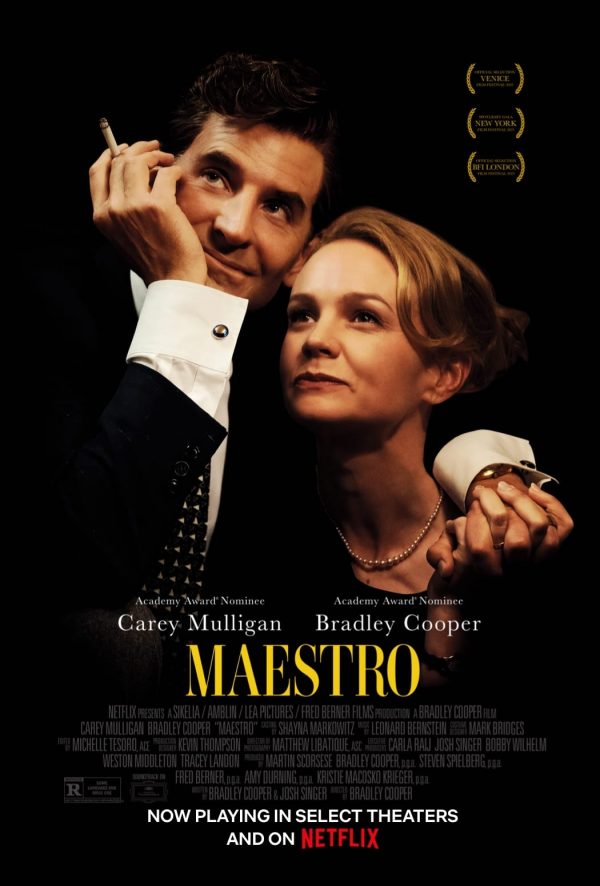
10. “Maestro” (USA)
A great talent deserves a great biopic. Regrettably, in the case of the late conductor/composer/musician Leonard Bernstein, he doesn’t get it. Writer-actor-director Bradley Cooper has made a film that I’m sure he thinks of as his cinematic masterpiece when, in fact, it comes across more like a tribute to the filmmaker’s own ego than as an homage to his subject. Perhaps the biggest problem here is the Oscar-nominated screenplay (how did that happen?), which can never really decide if it wants to be a litany of the accomplishments of the artist (Oscar nominee Cooper) or a love story between him and his adoring wife, Felicia (Oscar nominee Carey Mulligan). The constant switching back and forth between the two leaves viewers wondering which will be the focus that the director settles on. Then there’s Cooper’s increasingly hammy overacting, which grows progressively annoying as the film plays out, a performance riddled with knowing looks of “I know I’m going to get awards nominations for this portrayal.” Add to that a somewhat inexplicable shift from monochrome to color cinematography, and audiences are left further pondering the filmmaker’s cinematic motivations while simultaneously having to contend with notably underdeveloped depictions of the character’s motivations, making for a rather shallow take overall when it comes to exploring the protagonist’s nature. To its credit, “Maestro” features a fine production design and gorgeous Oscar-nominated camera work (especially in the black-and-white sequences), and Mulligan’s luminescent presence is positively captivating, in my view the only real reason for screening this offering in the first place. Otherwise, however, this is a big awards season disappointment (one that has stunningly earned numerous nominations in all of the major competitions, including seven Academy Award nods) that leaves much to be desired – and that likely would have been better off left in the hands of the project’s originally designated director, Steven Spielberg. Cooper may be a fine actor, but that’s what he should stick with, as that’s where his real strength lies – not behind the camera or sitting in the writer’s chair.
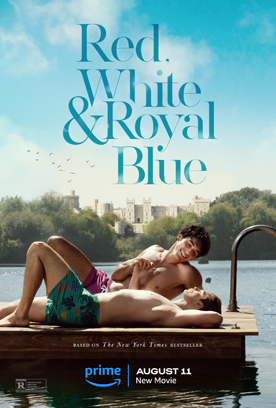
9. “Red, White & Royal Blue” (USA)
There are three things necessary to make a gay romantic comedy work: It needs to involve a readily recognizable gay relationship, it needs an undeniable sense of romance and it has to be funny. However, this heavily diluted, glacially paced piece of insipid celluloid fluff has none of the above, and it truly escapes me how many critics and viewers have found this utterly bland exercise to be heartwarming, charming and involving. In telling the somewhat far-fetched story of an alleged romance between a British prince (Nicholas Galitzine) and the son of an American president (Taylor Zakhar Perez) who start out as comically exaggerated adversaries but end up unconvincingly finding true love with one another, writer-director Matthew López subjects his audiences to a relationship wholly lacking in chemistry and stemming from an improbable courtship. Much of this arises from a string of all-too-convenient, less-than-discreet engagements that are ordinarily supposedly impossible to arrange and coordinate. What’s more, the film’s humor is virtually nonexistent and incorporates none of the edginess generally associated with gay comedies. In fact, it’s so dull and so safe that it makes most Hallmark Channel movies seem downright risqué by comparison. To its credit, the picture makes some modestly eloquent statements about LGBTQ+ equality (even if they’re nothing we haven’t already heard many times before), and it features a fine supporting performance by Sarah Shahi as a smart-mouthed, fast-talking presidential aide (arguably the only genuinely funny element in the film), but it misses the mark on so many other fronts that it’s hard to believe this project ever got green-lighted. It’s a shame that the door opened by “Bros” (2022) to make gay romcoms a more viable cinematic genre has been set back by this underwhelmingly disappointing effort. It’s also equally surprising that an organization like Amazon Studios – one known for generally doing solid work – could let something as sub-par as this out into the movie marketplace. Let’s hope moviegoers can put this one quickly behind them and see the foregoing issues soon fixed going forward.
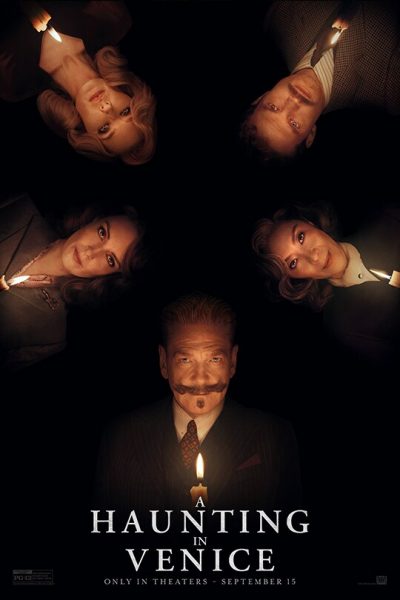
8. “A Haunting in Venice” (USA/UK/Italy)
The one thing a good whodunnit should not do is put its audience to sleep. Unfortunately, this latest cinematic adaptation of an Agatha Christie novel fails miserably on this score. Director Kenneth Branagh’s third outing as Belgian sleuth Hercule Poirot is a protracted snooze that leaves viewers caring little about the characters and even less about the story in which they’re trapped. When the famed detective (Branagh) – now in retirement in Venice – is called upon by a friend and author of murder mysteries (Tina Fey) to help her verify or discredit the psychic powers of a medium (Michelle Yeoh) at a séance at an allegedly haunted Venetian palazzo, he’s drawn into yet another of his famous investigations. The problem here is that what should be an engaging story is interminably dull, one that, regrettably, prompts frequent checking of one’s watch. Moreover, virtually the entire film is shot with excessively dark camera work (so much for showing off the glories of Venice). And then there are the performances, which feature good turns by Yeoh and Jude Hill but a positively wooden portrayal by Branagh (compared to his previous depictions of the protagonist) and an absolutely dreadful performance by a woefully miscast Fey. To its credit, like its recent predecessors, the production values of this Christie offering are top shelf, but that’s about all this release has going for it, a far cry from the much better overall work found in “Murder on the Orient Express” (2017) and “Death on the Nile” (2023). Indeed, even fans of the famed mystery writer are likely to find “A Haunting in Venice” tiresome and tedious. Pack a pillow for this one.
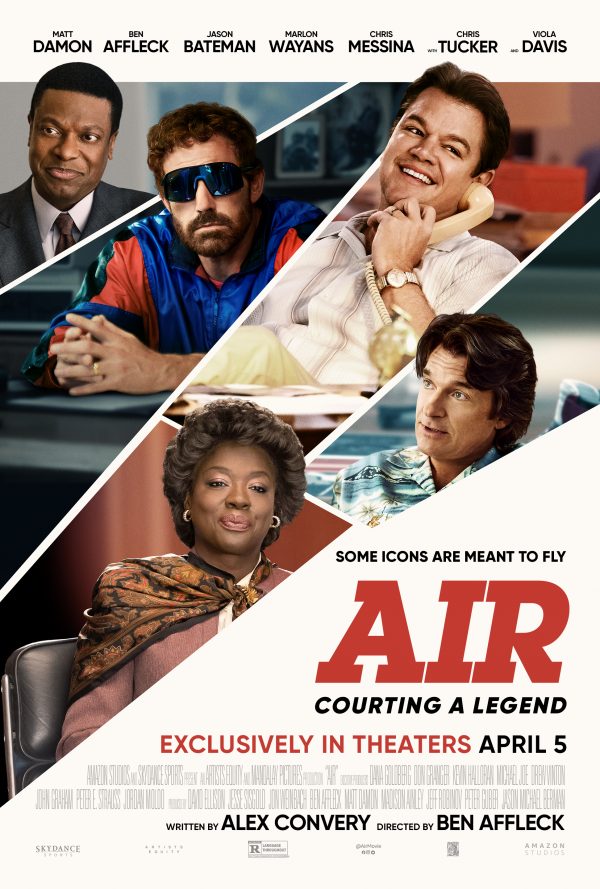
7. “Air” (USA)
I’ll put this in the simplest terms possible – despite efforts to dress this film up into something more substantial than it really is, at bottom, this is little more than a two-hour commercial for Nike. I’m truly puzzled how a film about sporting gear marketing could have ever gotten off the runway, even if it is a story tied to NBA legend Michael Jordan. Unless one has a diehard fascination with the intricacies of this particular line of business and/or an intimately detailed examination of the ancillary revenue streams of basketball stars, I see virtually no purpose for this picture’s existence. Director Ben Affleck’s latest is a major snooze fest in the first hour (my viewing companion was asleep after 10 minutes), improving somewhat in the second half (but that depends a great deal on whether one still cares by that point and/or has somehow managed to stay awake). Moreover, the claims that this was supposedly Golden Globe Award nominee Matt Damon’s best shot at lead actor accolades at the Oscars have proved to be grossly overstated (much as they were with “Stillwater” (2021)), as he turns in what amounts to yet another typically adequate (but far from sensational) Matt Damon performance. In the picture’s favor, it admittedly features a generally fine supporting cast, especially Viola Davis, Chris Messina, Chris Tucker and Matthew Maher, but their performances and a few catchy one-liners here and there are far from enough to save this offering from its pervasive shortcomings. Affleck has certainly done better work as a director (and actor) than he has here, so catch one of those other releases instead. And, if you’re really that interested in this slog (hard as that might be to imagine), catch it on streaming, but drink a big mug of strong coffee first.
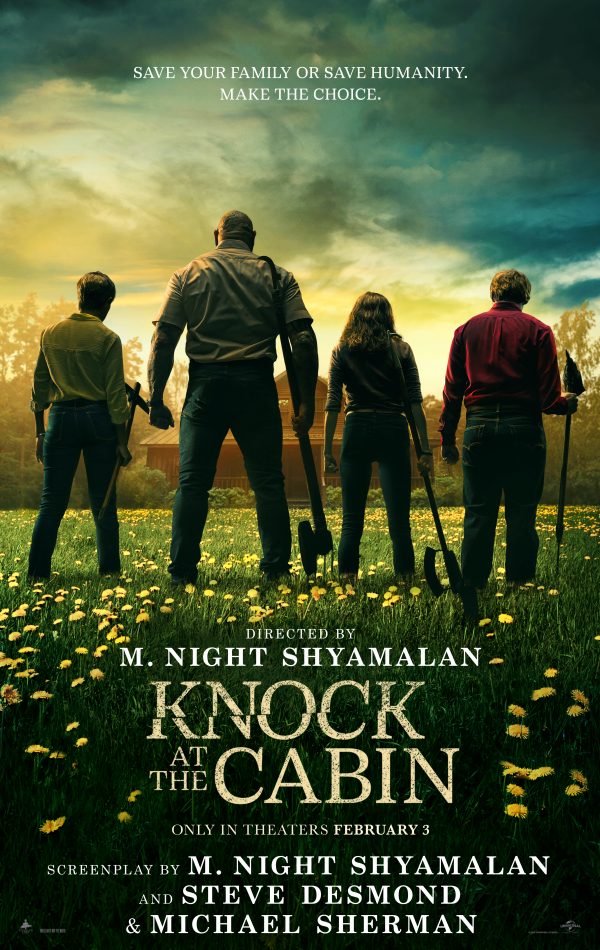
6. “Knock at the Cabin” (USA/China)
Writer-director M. Night Shyamalan truly is a filmmaker who has lost his way. The once-promising auteur has delivered yet another in a string of cinematic disappointments with this long-winded, overly talky, patently obvious, unsuspenseful account of an unexpected visit to a vacationing family (a pair of same-sex parents and their young adopted daughter) by the Four Horsemen of the Apocalypse (no, I’m not giving anything away here – that’s apparent from the trailer, let alone the excessively delayed revelation in the film). The members of this alternative household are given the option by their unforeseen visitors to sacrifice one of themselves in order to forestall the end of the world, an inevitability sure to materialize if they fail to comply. And, if they refuse, the bringers of doom will themselves be sacrificed, after which various calamities will be unleashed against humanity. As intriguing as this premise is, though, the players in this story, quite ironically, talk this possibility to death, leaving viewers wishing for something to happen to make the production even moderately interesting (talk about yawn city). In addition to the endless dialogue, audiences are fed a diet of cheesy, sometimes-implausible special effects, gratuitous violence (even if only by implication), and, surprisingly, the lack of a twist, one of this director’s signature artistic tricks. What’s more, actor Dave Bautista, as capable as he might be in any number of supporting roles, simply isn’t up to carrying the lead here as the head honcho horseman; he’s just not a strong enough performer for that. But what’s most troubling are the themes permeating this work, even if unintentional or only cautionary in nature. The “be very afraid of everything” message runs strong and deep, as does the picture’s conventional fire and brimstone religiosity. Even its well-meaning support of the gay community boomerangs on itself and ultimately reinforces (albeit inadvertently) stereotypically homophobic sentiments and outlooks. At this point, given the filmmaker’s track record, I’m puzzled that any backers would want to continue giving money to Shyamalan to keep making movies. It’s been a long time since he’s made anything worth watching, and this offering merely continues a trend that’s been going on for years now.
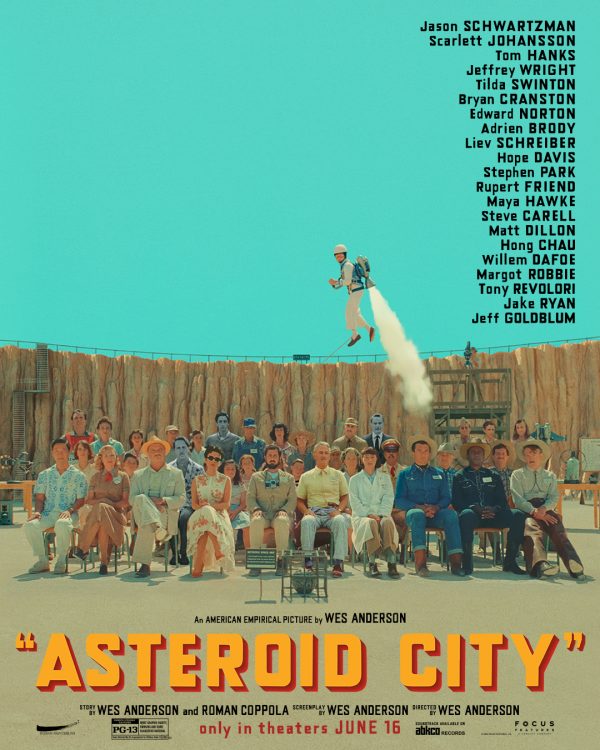
5. “Asteroid City” (USA)
Writer-director Wes Anderson is another director who has lost his way, and this film certainly proves it. I realize that the auteur’s signature style of filmmaking is an acquired taste, and, to his credit, he’s made some fine pictures over the years. But this one is not among them. In fact, contrary to many of the inexplicable claims that this is his finest release, I’d contend just the opposite. It’s arguably his worst, a meandering, cryptic, unfocused piece that’s so muddled you’ll need the assistance of a search party to find your way out of it (that is, if you even care by the time the end of this overlong mess rolls around). The director appears to have become so enamored with his own eccentricity that it doesn’t even seem to matter to him whether or not viewers are on the same page as he is. Admittedly, this offering once again captures Anderson’s singularly stylish look with a stunning production design and gorgeous cinematography. But that’s all it has going for it, and that’s unfortunate given the phenomenal cast he has available to him. What’s more, despite his proficiency in creating superb visual style, he’s forgotten about pairing it with meaningful (or even interesting) substance. Its incomprehensibility and inclusion of bits that are there just for the sake of their own whimsy seriously undercut any effort to make this an intelligible, engaging work. In short, “Asteroid City” was yet another major disappointment in what turned out to be a dreadfully dismal 2023 summer movie season. It’s likely to appeal only to diehard fans of the director (and maybe not even a lot of them this time out). If you’re on the fence about this offering, consider the following two telling tipoffs: (1) when no one in the theater laughed at what was billed as a comedy, that should speak volumes about it (as happened at the screening I attended); and (2) when you consider how aggressively and ubiquitously the distributors promoted this film in ads on TV and the internet, it’s obvious they were trying awfully hard to peddle shabby, substandard merchandise. This is a huge waste of time and money; don’t squander yours.
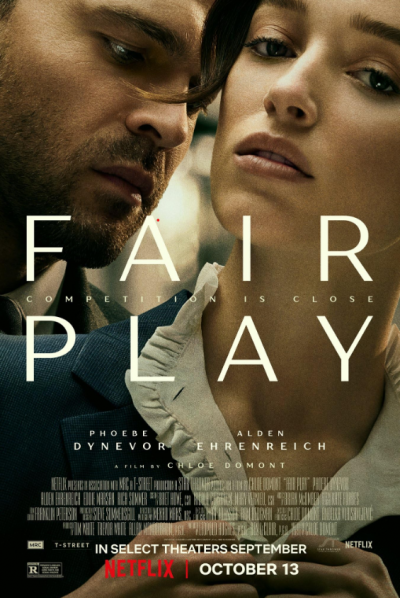
4. “Fair Play” (USA)
It’s amazing how one film can be predictable, implausible and preposterous all at the same time, but writer-director Chloe Domont’s debut feature manages to pull off this trifecta of lamentable attributes with remarkable ease. This alleged psychological thriller goes from bad to worse as its plot hole-filled story degenerates from a boring, clandestine office romance into an over-the-top envy-driven battle of egos when one partner unexpectedly gets promoted over the other at a prestigious Wall Street firm. The way in which this unfolds, though, is largely laughable, despite an underlying message that has some noteworthy merit (even if it’s a bit trite in this day and age). The picture might be more worth watching if the two protagonists (Phoebe Dynevor, Alden Ehrenreich) weren’t so inherently deplorable and portrayed with some of the hammiest on-screen acting I’ve seen in a long time. This is all made worse by one of the most awful scripts I’ve come across in a while, with almost as much tawdry, needlessly foul language since “The Wolf of Wall Street” (2013). Put these qualities together and you’ve got an absolute work of utter trash that makes the prime time soap operas of the 1980s look like epic storytelling. Indeed, as far as how this one plays, all I can say is “No fair.”
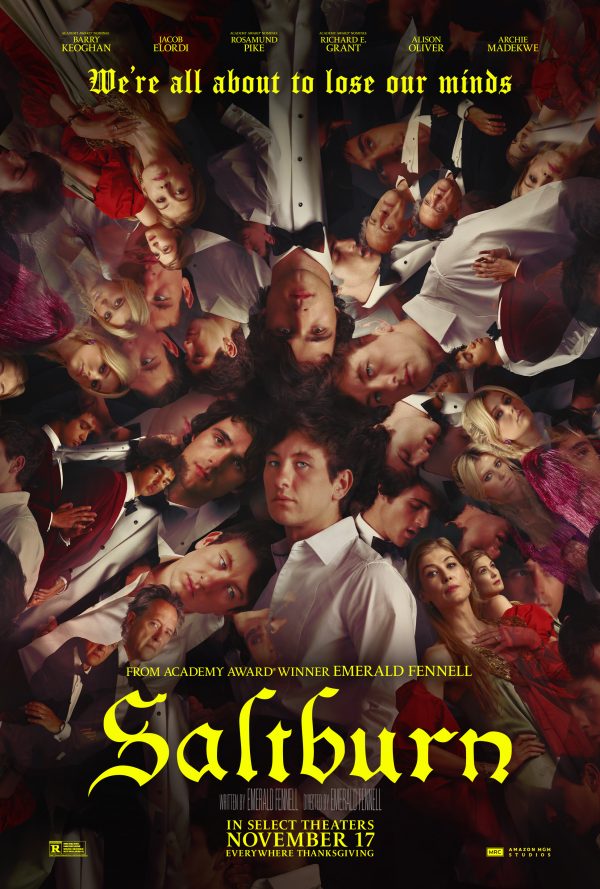
3. “Saltburn” (USA/UK)
Sometimes you come across a filmmaker whose works you just don’t like. And now, after two features in, I can honestly say that about writer-director Emerald Fennell. I didn’t care much for her debut outing, “Promising Young Woman” (2020), and I can say the same (and more) about her follow-up effort, “Saltburn.” This alleged thriller about a seemingly awkward but quietly sinister Oxford student (Golden Globe and BAFTA Award nominee Barry Keoghan) who ingratiates himself into a family of wealthy English aristocrats features a story and characters about whom, quite frankly, I couldn’t care less. (Think “The Killing of a Sacred Deer” (2017) with a cast of eccentric old money cronies and a wolf in sheep’s clothing.) This assemblage of utterly reprehensible characters living utterly reprehensible lives and zealously adhering to utterly reprehensible values fails to engender viewer empathy, interest or even connection. Much of the narrative is predictable and glacially paced, incorporates sequences that are included for little more than forced shock value (many of them is egregiously poor taste), features monodimensional and blatantly obvious (almost trite) character development, and frequently stumbles in attempts at humor that are wedged in largely for the sake of convenience or calculatedly timed comic relief. It’s the kind of picture that prompts regular looks at one’s watch to see how much more one must endure and delivers welcome sighs of relief when the end finally comes. What’s more, given the combined talent pool for this production, it’s a genuine shame to see the likes of Carey Mulligan, Richard E. Grant, and Golden Globe and BAFTA Award nominee Rosamund Pike relegated to supporting roles in which their abilities are sorely underused. And then there’s the excessively hammy performance of Keoghan, who’s quite obviously (and knowingly) acting and not disappearing into the bona fide portrayal of a character. In all, this offering, with its numerous inexplicable awards competition nominations, feels like a picture that tries awfully hard to see how much it can get away with, especially when seeking to invoke dropped jaws among audience members, much as this director’s cinematic predecessor attempted to do. Save your money, and don’t waste your time on this vastly overrated release from a vastly overrated filmmaker.
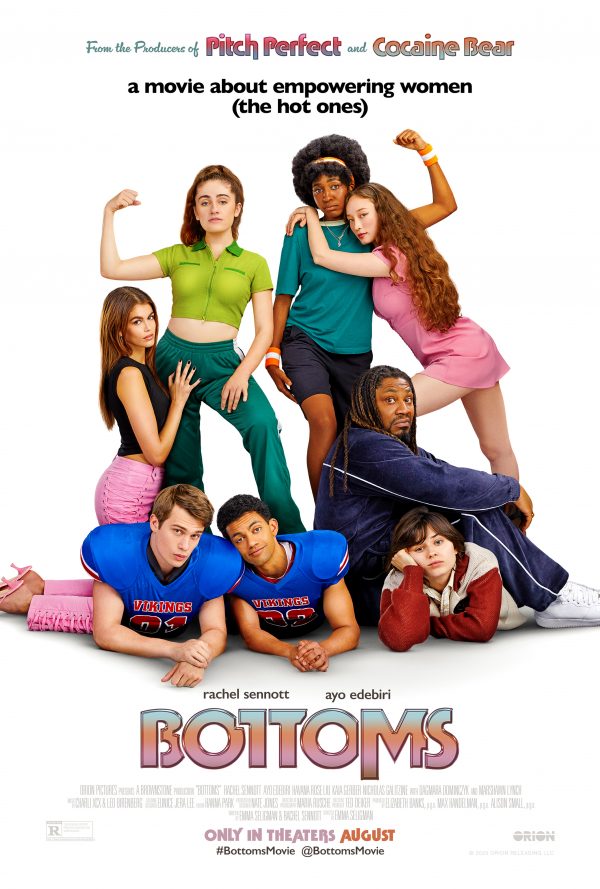
2. “Bottoms” (USA)
I hate to admit it, but I allowed myself to be suckered in to this one as a result of its rambunctiously funny trailer only to be grossly disappointed at what I saw. This is a positively dreadful film, and I’m at a complete loss to understand how viewers have found it funny. When a pair of lesbian high school students (Rachel Sennott, Ayo Edebiri) establish a fight club (i.e., a euphemistically labeled “self-defense program”) as a means to surreptitiously bed down their cheerleader classmates (an implausible story line that’s more than a little dubious in itself), they subsequently launch into a meandering narrative that makes little sense and plays like it was made up by a group of stoners who’ll laugh at anything when suitably smoked up. The film starts out trying way too hard and then proceeds to quickly go downhill from there. Much of the material is in questionable taste, too, such as sequences that feature unrestrained physical abuse against women, as well as other forms of sanctioned violence. How is this stuff supposed to be funny? “Bottoms” has been described by viewers and critics as a go-for-broke/anything-for-a-laugh comedy, but I found its distasteful stabs at humor cringeworthy at best. What’s more, the picture’s feeble attempts at trying to inject the narrative with a message related to women’s empowerment are completely betrayed by its many wrong-headed plot devices. To the film’s credit, it does feature some passable performances by its supporting cast (most notably Punkie Johnson, Dagmara Dominczyk and former NFL star/Independent Spirit Award nominee Marshawn Lynch). But, sadly, this effort is a big step down for director Emma Seligman and writer-actor Rachel Sennott, both of whom turned in brilliant work in their raucous collaboration, “Shiva, Baby” (2020) (not to mention that Sennott’s casting represents a laughable choice for someone who’s nearly 28 attempting to portray an 18-year-old character). It’s also quite a comedown for producer Elizabeth Banks, who scored big earlier in 2023 with the utterly hilarious “Cocaine Bear.” It occurred to me after watching this debacle that maybe I’m just getting old and losing my sense of humor, but, after thinking it over, I realized that’s genuinely not the case. And how it earned nominations in the Independent Spirit Award and Critics Choice Award competitions is truly beyond me. “Bottoms” may indeed represent a case of changing movie tastes, but, if that’s so, I’m seriously troubled about the direction in which those tastes are headed.
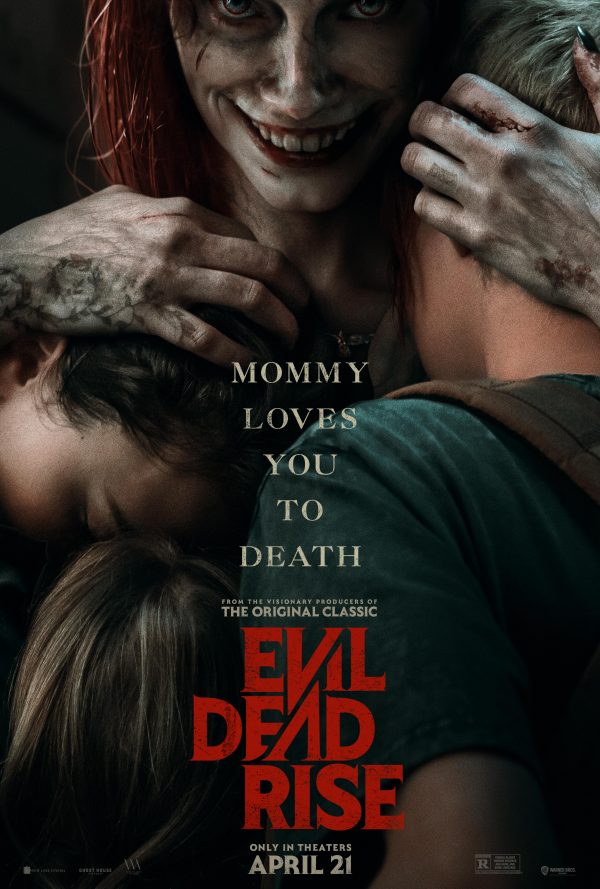
1. “Evil Dead Rise” (USA/New Zealand/Ireland)
As contemporary horror films go, I’ll freely admit that this is a genre about which I couldn’t care less. I find most of these films boring, predictable, stupid and not especially scary. In fact, the only ones to which I’ll even give a second look are smart horror films (like “Get Out” (2017) or “Annihilation” (2018)) or campy romps (like “Renfield” (2023)). So the fact that I somehow managed to sit through this positively disgusting trash heap is quite an accomplishment. (Actually, the only reason I watched was because I was channel surfing and there was nothing else on, so I decided to give it a chance (I would have been better turning on the radio).) This pointless parade of endless blood and gore is a prime example of the decline of the mainstream movie industry (how projects like this get greenlighted is beyond me, except, of course, for the obvious box office considerations). It’s so utterly ridiculous that the picture plays like something that was made up as the crew went along. I’ll admit that there was some modestly cheeky humor here, but not enough to make it a genuine camp fest. Writer-director Lee Cronin’s latest is an assault on the art of filmmaking, the kind that should carry fines and other punishments. My goodness, what has this industry come to?
Dishonorable Mentions
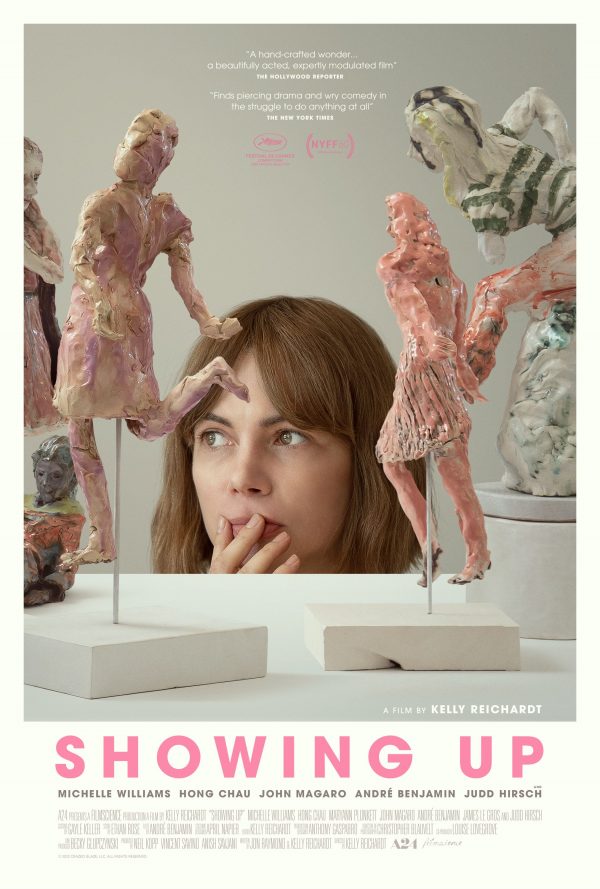
11. “Showing Up” (USA)
When I come across a film that’s the cinematic equivalent of witnessing the emperor’s nakedness, I feel compelled to shout it from the rooftops, something I would readily do with regard to this latest comedy-drama from director Kelly Reichardt. This plodding, meandering, insular, minimalist, frequently inscrutable offering tells the “story” (if it can even be called that) of a Portland ceramic sculpture artist (Michelle Williams) struggling to create her works for an upcoming gallery show when faced with the distracting burdens of mundane domestic crises and incendiary but largely unexplained family issues. However, little happens here, and the narrative is more of a showcase for the movie’s artwork than a vehicle with a definable plot, a problem further enhanced by a lack of any meaningful back story and solid character development (I guess that what they mean by “nuanced”). Indeed, one can tell when a release like this is truly in trouble when its most interesting and best defined characters are a housecat and an injured pigeon. The picture’s feeble attempts at humor nearly always fall flat, too, most of which are drier than dust (there’s subtle and then there’s inconsequential). It really troubles me when I see a seriously undercooked production like this undeservedly becoming widely acclaimed with over-inflated accolades. I’ve found this also to be the case with many of this filmmaker’s other works, but “Showing Up” represents a new low in her filmography. Not even the award-winning ensemble cast, with the likes of Williams, Hong Chau, Judd Hirsch, Amanda Plummer and Maryann Plunkett – the picture’s only noteworthy asset – can save this one from its own inherent failings. Experimental cinema is one thing, but unfocused, pointless, stream of consciousness filmmaking is something else entirely.
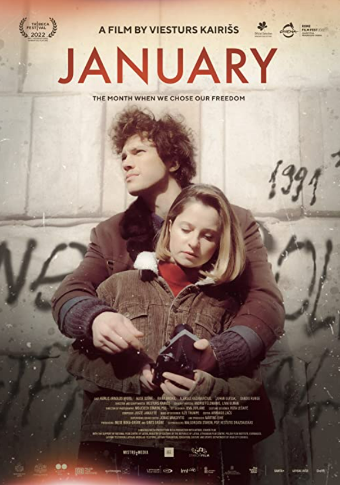
12. “January” (“Janvaris”) (Latvia/Lithuania/Poland)
The 1991 independence movement led by the Baltic states of Lithuania, Latvia and Estonia in the days preceding the collapse of the Soviet Union was a dynamic but dangerous time in the re-emergence of those nations as sovereign states, a subject that has provided the basis for a growing number of recent cinematic releases. Because of these conditions, it was also a time when the citizens of those republics had no clear indication of what the future would hold. Could they successfully break away, or would they come under the harsh retribution of their superpower occupiers? And what did those residents think about these possibilities – should they support revolution or remain ostensibly loyal to those who could potentially crush them with little effort? When these circumstances are added to the personal uncertainty associated with someone who’s in the throes of coming of age, these questions loom even more profoundly. Such is the case in this historical drama about an aspiring young Latvian filmmaker (Karlis Arnolds Avots) looking to find himself amidst all of the surrounding chaos, both in his homeland and in neighboring Lithuania, either as an experimental auteur or a documentarian of what was transpiring around him. The protagonist also wrestles with an on-again/off-again romance involving a cinematic colleague (Alise Danovska), as well as his decision of whether or not to honor his Soviet conscription obligation. On the surface, all of this would appear to offer the makings of a powerful, compelling, first-class drama, but the unbalanced execution of writer-director Viesturs Kairiss’s narrative keeps the film from living up to that potential. The principal issue here is a story that takes far too long to get off the ground, incorporating a wealth of easily excluded extraneous material that adds little to capturing the character of the time and the merits of its associated scenario. And, when things finally do get on track, there’s a good chance viewer interest may have been lost long by that point (I know it was with me). It’s baffling that this offering was considered worthy enough to win the best international narrative feature at the 2022 Tribeca Film Festival, along other comparably dubious accolades. In short, this should have been a terrific picture, but, unfortunately, it represents a lost opportunity for telling an engaging story about a tense time and how a lost soul tries to find his place in it.
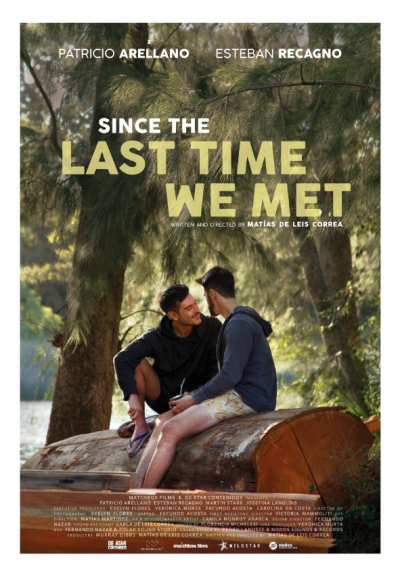
13. “Since the Last Time We Met” (“Desde la última vez que nos vimos”) (Argentina)
If you’re looking for a film about how not to conduct yourself in a gay male relationship, this is it. Writer-director Matías De Leis Correa’s second feature outing is a talky, jumbled mess about the dysfunctional reunion of two long-separated partners (Patricio Arellano, Esteban Recagno) who constantly paw at one another but can’t make up their minds about what they want for the future. In a story that pretentiously deals with the supposed power of love and unrestrained raw emotion, the film ends up being little more than an exercise in whiny, circular, often-contradictory discussions about relationships and responsibility as a precursor to soft-core gay male porn. The picture tries hard to pass itself off as a work of poetic, heartfelt romance but is in actuality little more than slickly produced justification for bad behavior. What’s more, the story grows ever more tedious as it unfolds, straining to evoke sympathy from audience members for the selfish expectations and doormat subservience of its two remarkably unlikable protagonists, plot devices that regularly and increasingly prompt sighs and reactions of “Oh, come on already!” While this release admittedly features some fine camera work of the Argentinean landscape, that’s about all it has going for it. This one is easily skipped.

14. “The Beautiful Summer” (“La bella estate”) (Italy)
It’s frustrating to watch a film that’s ostensibly headed along a particular trajectory but that continually stumbles on the path it takes to get there. That’s precisely what happens in this period piece coming out/coming of age story set in 1938 Italy. Writer-director Laura Luchetti’s adaptation of Cesare Pavese’s 1949 novel about an impressionable 17-year-old dressmaker (Yile Yara Vianello) who becomes romantically infatuated with an artist’s model (Deva Cassel) takes its own sweet time (and plenty of overlong detours) in making its way toward a seemingly foregone conclusion. But, even when this offering apparently approaches that destination, it takes yet another unexpected left turn and subsequently leads to what the filmmaker herself admits is a deliberately ambiguous conclusion. Consequently, this is the kind of movie that’s likely to leave many viewers scratching their head and asking, “What’s the point of all this?” The picture is allegedly intended to address a subject that was considered taboo at the time of the story’s setting and of the book’s writing, but that objective isn’t fulfilled nearly as clearly as it might have been. As a result, whatever lofty intentions might have been behind the initiation of this production, they’re decidedly obscured in the final cut. There are also some passing references to the fascist sociopolitical conditions of the time (elements not included in the source material), but they’re never developed much, making their inclusion look like throwaway afterthoughts. To its credit, “The Beautiful Summer” has some fine cinematography, well-chosen location settings showcasing the beauty of Turin and a stirring soundtrack, but, if these attributes are the best that one can say about the film, that’s not saying much about the picture overall. Luchetti’s third feature outing truly needs ample retooling to make it work, because, as it stands, it doesn’t.
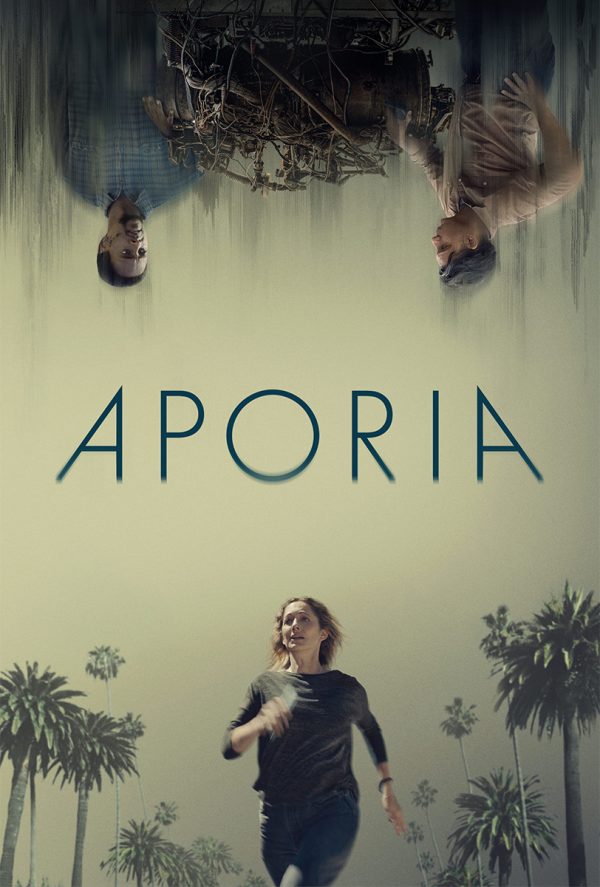
15. “Aporia” (USA)
For those unfamiliar with the term “aporia,” it refers to a state of puzzlement or bewilderment, especially in philosophical and ethical discourse. And, in the case of this latest effort from writer-director Jared Moshé, it’s equally applicable to the essence of this film’s existence. This romantic sci-fi saga of a nurse, Sophie (Judy Greer), who loses her engineer/physicist husband, Mal (Edi Gathegi), to a drunk driver follows the efforts to bring him back to life with the assistance of her late spouse’s best friend, Jabir (Payman Maadi), a fellow scientist with whom he was working on a time machine. Unfortunately, the device doesn’t function as intended, but it is nevertheless capable of sending a deadly subatomic particle through time whose impact is capable of killing someone – in this case, the proposed target being the motorist who killed Mal. The prospect poses a daunting ethical dilemma, but Sophie agrees to it, and she soon finds herself back in the company of her husband. But changing the past carries consequences, many of them unforeseen and difficult to deal with. The film presents an intriguing premise, to be sure, but one not unlike what was previously examined in “The Butterfly Effect” (2004). What’s more, this offering is plagued by a number of issues, such as needlessly slow pacing, insightful but overlong ethical debates and a stunningly unsophisticated temporal device that looks like one of Rube Goldberg’s comical contraptions. The biggest problem by far, though, is one of narrative credibility – not from a scientific standpoint but from a moral one: It’s hard to believe that these three supposedly intelligent individuals can be so casual and cavalier when it comes to their ethics and morals. I find it unfathomable how a supposedly compassionate caregiver like a nurse could so willingly go along with a harebrained plan to willfully kill someone for self-serving purposes; it’s a hallow, contrived and patently unbelievable story arc. And, when efforts to make up for this transgression surface, the plot truly starts to go off the rails. Indeed, the logic behind this tale truly needs to be rethought and reworked, because, as it stands now, it genuinely leaves philosophically minded viewers in a deep state of aporia, especially when it comes to figuring out why they bought a ticket to watch it in the first place.
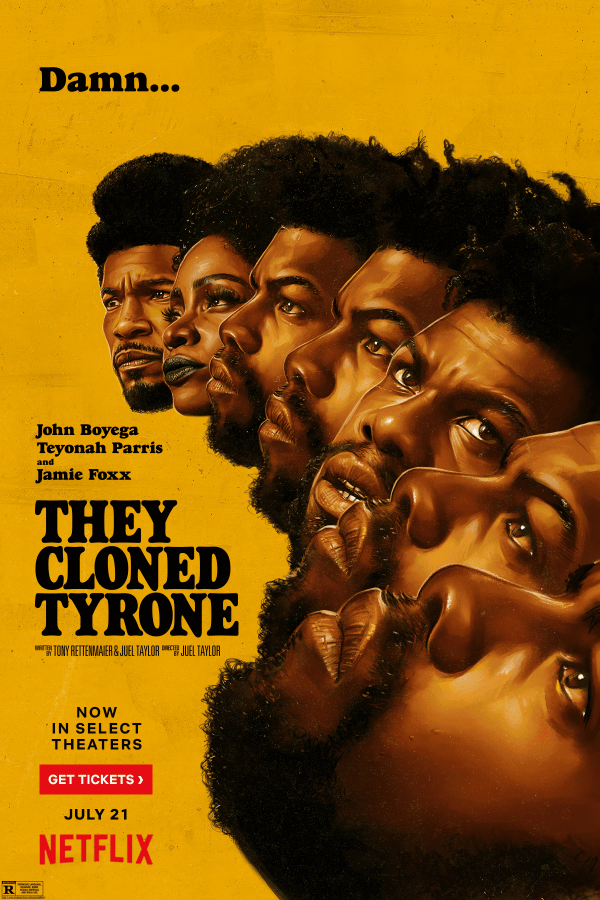
16. “They Cloned Tyrone” (USA)
When a drug dealer (John Boyega) in a predominantly African-American inner city neighborhood dies in a revenge killing, his friends and colleagues are stunned to find him alive and healthy the following day. That’s particularly true for two of his regular associates, a pimp (Jamie Foxx) and one of his ladies of the evening (Teyonah Parris). Together, the unlikely trio proceeds to investigate what’s going on, only to soon find themselves in the midst of a fiendish social experiment involving cloning, mind control and behavior modification targeting their entire neighborhood, a clandestine initiative operated by an evil organization headed by a bigoted mastermind (Kiefer Sutherland). As intriguing as that narrative may sound, however, the picture’s execution leaves much to be desired. For starters, the film is trying way too hard to imitate the works of writer-director Jordan Peele, with more than a few thinly veiled elements that echo “Get Out” (2017) and “Us” (2019). Then there are a number of serious technical issues, most notably the picture’s truly horrendous sound quality (generally throughout, but especially in the first 30 often-undecipherable minutes) and its needlessly dark cinematography (there’s a big difference between atmospheric and incomprehensible). To top that off, many of this release’s attempts at humor fall flat and/or lazily rely on shamelessly milking well-worn stereotypes, often verging on insulting. To its credit, “They Cloned Tyrone” does offer some valuable (if a bit overly obvious) pieces of social commentary, making the second half more watchable than the first. It also features a fine performance by Parris, who often steals scenes and leaves her co-stars in the dust. Nevertheless, writer-director Juel Taylor’s second big screen feature fails on so many fronts that the shortcomings undermine what could have been a hilarious sci-fi thriller if left in more skilled hands (like Jordan Peele, perhaps?). Take a pass on this one.
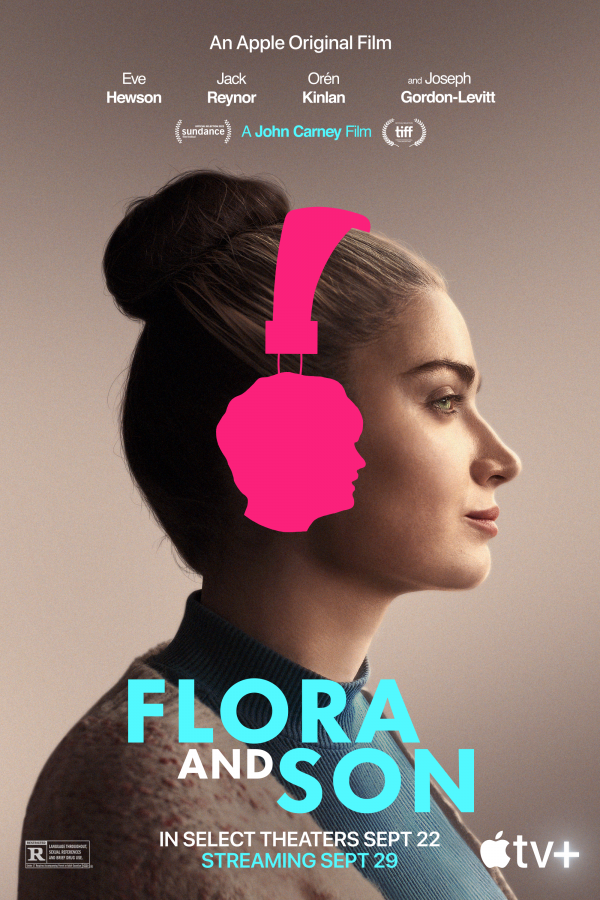
17. “Flora and Son” (USA/Ireland)
The hype swirling around this romantic/creative saga about how the power of love and art can solve virtually any problem has indeed been palpable, but the finished product unfortunately fails to live up to its ambitious billing. Writer-director John Carney’s latest feature tells the story of Flora (Eve Hewson), a Dublin working class single mom with questionable values who’s struggling to raise her (allegedly) rebellious teenage son, Max (Orén Kinlan). But, in doing so, the picture tends to wander amidst an array of diverse story threads, all of which start out dubious but gradually mellow into a mass of schmaltzy harmony, a somewhat implausible scenario given the patently unlikable and irresponsible nature of its central characters. The means for accomplishing this transformation is Flora’s budding love of music, a newfound passion brought about in large part thanks to her online relationship with Jeff (Joseph Gordon-Levitt), a deadpan, middle-aged Los Angeles-based guitar instructor, a relationship with obvious (but not especially credible) romantic underpinnings. However, in telling this tale, the film gets bogged down by elements like Max’s frequent but unconvincing rebelliousness, Flora’s turbulent relationship with her ex-husband, Ian (Jack Reynor), and a series of long-winded, tedious, supposedly sensitive conversations between Flora and Jeff. To its credit, the film has its share of biting one-liners and a breakout performance by Hewson, but much of this production never really seems to know where it’s going and ends up relying on trite, formulaic plot tropes to wind things up. Regrettably, “Flora and Son” represents yet another example of a film that seriously could have benefitted from further revision and development before being committed to a final cut, an all-too-familiar problem with many cinematic releases in recent years.

18. “Chevalier” (USA)
Imagine a prime time soap opera with 18th Century French period piece trappings, and you’ve pretty much got the gist of this fact-based (and loosely so, I understand), underwhelming offering from filmmaker Stephen Williams, a director best known for his acclaimed cable TV series work (which is probably why this release feels so much more like a television piece than a movie). The picture presents the biography of Joseph Bologne (Kelvin Harrison Jr.), the Chevalier de Saint-Georges, an acclaimed multiracial violinist and composer who rose through the social ranks to attain a celebrated place in the court of Marie Antoinette (Lucy Boynton) in pre-revolutionary France. But, rather than focusing on Bologne’s accomplishments (many of which have been lost over time but are allegedly traceable), the film instead tells the scandalous (for the time) tale of a failed interracial romance and its fallout, a story that deeply affected him personally and changed the artist into an advocate for society’s downtrodden (noble ambitions that, regrettably, receive short shrift in the film). While all of this should provide the makings of a captivating watch, much of it falls dreadfully flat – a collection of pretty images populated with arrogant, elegant aristocrats casting knowing glances and wry smiles but not providing significant fodder for viewer engagement. Such blandness even spills over into the performances, like that of protagonist Harrison, an actor whose work I generally admire but who comes across here to be about as interesting as a bowl of lukewarm porridge. To me, it seems like so much more could have been done with this story, but what comes from it here is stunningly uninteresting and uninvolving, a disappointment given that Bologne deserves better than this.
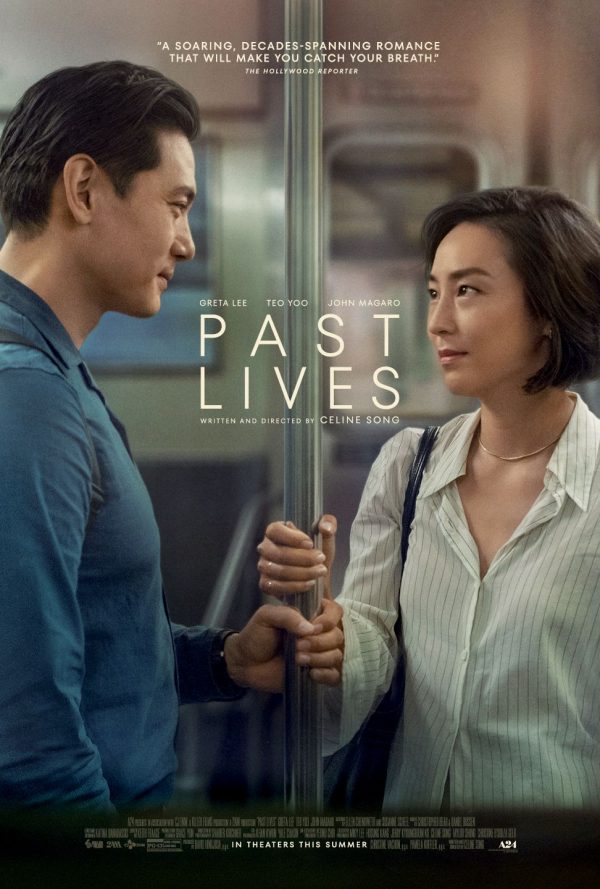
19. “Past Lives” (USA/South Korea)
As the son of parents who were childhood sweethearts/soul mates, I tend to be a sucker for movie romances that address this subject. In this case, however, the only “sucker” aspect applies to me and the money I plunked down to watch this two-hour snoozefest, an undeserving Oscar nominee for best picture, as well as the recipient of accolades from numerous other awards competitions. Writer-director Celine Song’s debut feature has been praised as a masterful piece of filmmaking and one of the best pictures of 2023, but I heartily beg to disagree. When a pair of young, tightly knit Korean children, Nora (Greta Lee) and Hae Sung (Teo Yoo), part ways from their native Seoul and are later reunited in New York after a 24-year separation, the reunion of these onetime pals provides them with an opportunity to reflect on their relationship and what might have been. However, their time together consists mostly of a series of bloated pregnant pauses, inane dialogue and missed chances to discuss much of anything meaningful, the kinds of scenes that make even the most patient viewers want to yell “Get on with it already!” These “conversations” come nowhere close to matching the joy of their spirited youthful interactions or the heartfelt, substantive talks that take place between Nora and her eventual American husband, Arthur (John Magaro). And, as the title implies, there’s a reincarnational theme that’s assumed to play a role here, but it’s so heavily diluted and lamely handled that it comes across as an underdeveloped afterthought, one that could have easily been left out entirely with no impact on the story (though it probably could have added a lot if given greater weight). The overall result is, quite frankly, a big fat bore that’s trying to be more than it is but never achieves that outcome, relying on alleged “deftness” and “nuance” that never end up bearing significant fruit. Perhaps the biggest problem with all this is the film’s apparently sincere but decidedly paper thin narrative (and inexplicably Oscar-nominated original screenplay) that doesn’t have the writing support to bring it all into beautiful full bloom, despite some fine performances, exquisite cinematography and an emotive background score. From this work, the director would appear to have a hefty reserve of artistic potential stashed away, at least based on this offering’s stylistic elements, but it just doesn’t show in the end product. Indeed, the substance could use some definite and considerable shoring up. Let’s hope she gets that right the next time.
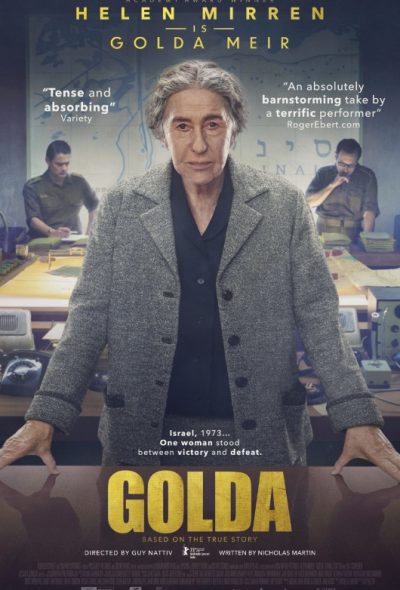
20. “Golda” (USA/UK)
Paying homage to a country’s great leader is certainly a worthy and noble undertaking, but, when it comes to director Guy Nattiv’s would-be tribute to Israeli Prime Minister Golda Meir (Helen Mirren), the film comes up far short of what it could have been. The film focuses on Meir’s handling of the 1973 Yom Kippur War, when the nation was on the brink of collapse from “surprise” (though strongly anticipated) attacks by Egypt and Syria, largely as retribution for their territorial losses in the 1967 Six-Day War, with significant support from the Soviet Union. The picture presents a detailed by-the-numbers account of the conflict, including Meir’s involvement with her top military advisors and with US Secretary of State Henry Kissinger (Liev Schreiber). Granted, it’s important to understand this background to provide context for the stage on which this drama plays out. However, for a release called “Golda,” one would think that its focus would be more focused on the title character, as a biographical sketch that just happens to be set during wartime. Instead, because of this, Meir is almost reduced to a supporting player in a much wider cast of characters playing out the specifics of the conflict (at least in the first half). There’s virtually no back story about the PM as an individual, providing little insight into who she is and how that impacts her approach to handling the combat. To its credit, the film improves in the second half, especially when it starts presenting Meir’s story from a somewhat more personal perspective. By that point, however, the filmmaker has already lost his audience for what this offering could and should have been. Viewers come away from this one knowing little more about the woman who was a national hero in a time of crisis than what they would likely find in history books and documentary films. In fairness, Mirren and Schreiber deliver fine performances, disappearing into their respective roles and making this production look better than it actually is. But that’s not saying much given what seems to be the genuinely sincere intent that was behind this release. Unlike Meir, this film simply doesn’t rise to the challenge (its Oscar nomination for best hair and makeup notwithstanding), and that’s unfortunate considering who it is ultimately trying to honor. And, because of that, it should come as no surprise why this offering ended up in the late summer stash of cinematic also-rans.
Disappointments (In Alphabetical Order)
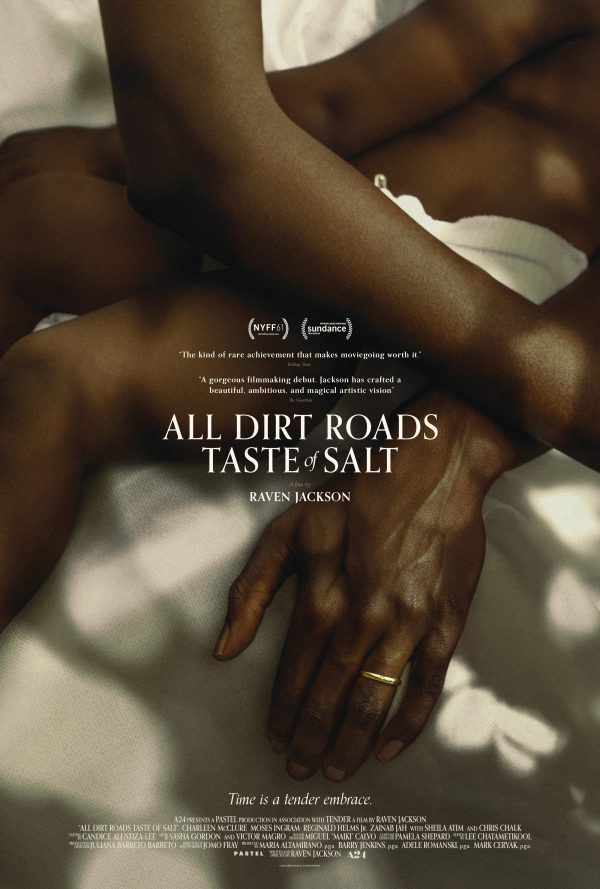
“All Dirt Roads Taste of Salt” (USA)
When creating a film that’s best described as experimental, ambition goes a long way toward the fulfillment of that goal. However, it’s not enough to carry the project if it doesn’t have something meaningful or profound to say in the end product, and that, unfortunately, is what’s missing from the Independent Spirit Award-nominated premiere effort from poet Raven Jackson in her writing/directing feature debut. This offering is perhaps best characterized as a visual tone poem examining the decades-long life of an African-American woman (Charlene McClure) in rural Mississippi from childhood to becoming a grandmother. It’s light on narrative and seeks to tell its story visually a la the likes of Terrence Malick, relying more on showing than telling, a noble undertaking, to be sure. Nevertheless, the picture leans on its imagery so heavily that it often fails to convey anything of real substance, despite its visual beauty and some obviously heartfelt sequences in which the principals’ emotions are indeed palpable and affecting. In between, though, the story begins to feel padded after a while, striving to capture profound insights through events that are too innately incidental and inconsequential to express anything truly enlightening, reflective or philosophically rich. Instead, it offers viewers a biographical look at one individual’s ties to the people, places and everyday events that made up her life, a depiction that, regrettably, plays more like a home movie with arthouse treatment. This is perhaps best exemplified by a nearly 10-minute sequence of a hug that, frankly, grows stunningly tedious in far less time than that. I suspect that these shortcomings probably arise from the filmmaker being too close to her own subject matter, given that many of the characters in this story are said to be based on the lives of people from her own family and ancestors. Those elements may be deeply moving to her, but they don’t translate into material that would mean much to those outside her own immediate circle. With that said, however, this release is not without its merits, most notably its gorgeous Independent Spirit Award-nominated cinematography and beautiful original score. Beyond that, though, “All Dirt Roads Taste of Salt” is likely to try the patience of many viewers, including those willing to give a chance to its attempt at an alternative inventive approach. This truly feels more like a film or art school project than something that would appeal to even the most ardent of diehard open-minded cinephiles. And that’s unfortunate, because I’m sure there’s an interesting story buried somewhere within this material. Sadly, it never surfaces but remains camouflaged in its own artistic trappings.
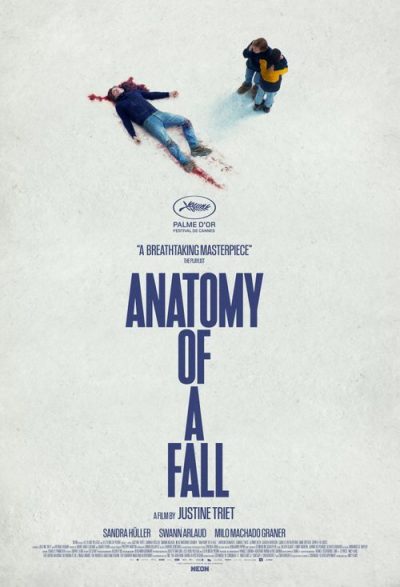
“Anatomy of a Fall” (“Anatomie d’une chute”) (France)
It’s always disappointing when a film aspires to greatness that it never achieves. Such is the case with the latest offering from Oscar-nominated writer-director Justine Triet, whose allegedly suspenseful thriller is about as appetizing as a plate of tepid leftovers. This crime investigation/courtroom drama about the mysterious death of a middle-aged unsuccessful writer (Samuel Theis) who falls from the second story of his mountain chalet looks into whether his demise is due to suicide or murder, with his wife (Sandra Hüller), herself a best-selling author, being the prime suspect. Despite an intriguing premise, however, the movie is overlong, needlessly talky and inherently flat, with a cold, clinical, unengaging narrative and characters who engender no connection, compassion or empathy with the audience. In essence, this is a “whodunnit” that plays like an extended “whocares.” Fault the Oscar-nominated original screenplay, which seeks to tell a tale in the same gripping vein as such great courtroom dramas as “Anatomy of a Murder” (1959) but that never achieves the level of tension, mystery and audience engagement needed to pull that off. The meticulously orchestrated script here instead feels calculated and derivative virtually from start to finish, especially in its trial sequences, which explore an array of possible motives and explanations, including everything from infidelity to plagiarism to previous suicide attempts, that rely on often-implausible speculation and inflated conjecture to carry forward a proceeding that probably never should have ended up in court in the first place. What’s more, the double entendre that is the picture’s title is so obvious that any hopes of nuance, subtlety or profundity evaporate quickly once the failing nature of the couple’s troubled relationship surfaces. While the film admittedly features a fine performance by Academy Award nominee Hüller (though not on par with her better role in “The Zone of Interest”), it’s far from enough to rescue a picture with big aspirations that never pan out. How this release has garnered so much widely exaggerated awards season buzz, including an Oscar nod for best picture, is beyond me, especially given its intrinsically insipid, underwhelming, overstated character. There are plenty of other films of this ilk out there that are far more worth watching than this one, so grab one of those better selections instead and give this one the well-earned pass it genuinely deserves.
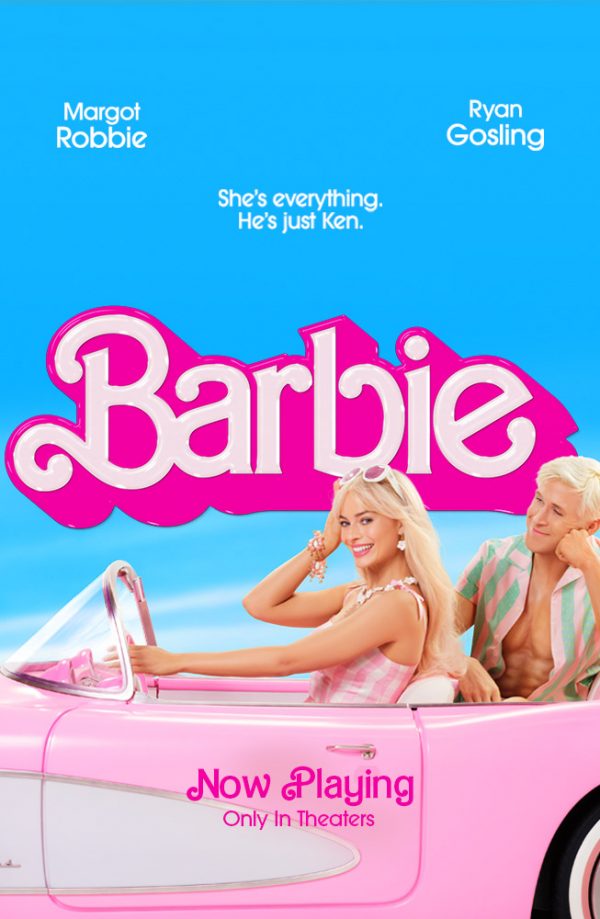
“Barbie” (USA/UK)
“Heavy is the arm that wears its heart on its sleeve.” That’s the best way to sum up this overwritten, overlong, stunningly obvious treatise on gender equality, consumerism and existentialism, whose messages get beaten to death beginning early on and never let up, an exhausting experience, to be sure. Writer-director Greta Gerwig’s latest offering, co-written with collaborator Noah Baumbach, features a dreadful (and, ironically, Oscar-nominated) adapted script (adapted from what?) that’s about as subtle as a young adult novel. What’s more, this highly decorated awards season nominee drones on and on and on for about 30 minutes longer than it needs to be, becoming endlessly repetitive and incorporating irrelevant and several disingenuous story threads that could have easily been scaled back or eliminated entirely (such as those with Will Ferrell and Michael Cera). In addition, much of the dialogue is either stupefyingly juvenile or sounds more like “writing” than anything anyone would actually say (even for a fictional fantasy character), with attempts at humor that often fall woefully flat. And, to be honest, for all intents and purposes, the project comes across like a two-hour commercial for Mattel (even if the company manages to find ways to poke fun at itself). To its credit, “Barbie” does have a few strengths going for it, such as its superb production design, some genuinely clever humor (especially in its opening pre-titles sequence and occasional asides), and fine performances by Margot Robbie and Oscar nominee Ryan Gosling (both of whom manage to make this material look better than it actually is), as well as a capable Oscar-nominated turn by America Ferrera and a heartwarming appearance by Rhea Perlman. Beyond that, though, this was handily the most overrated, overhyped release of 2023, one that’s ultimately easily forgettable – and one that conclusively proves the power of effective marketing, no matter what the quality of the merchandise being promoted.
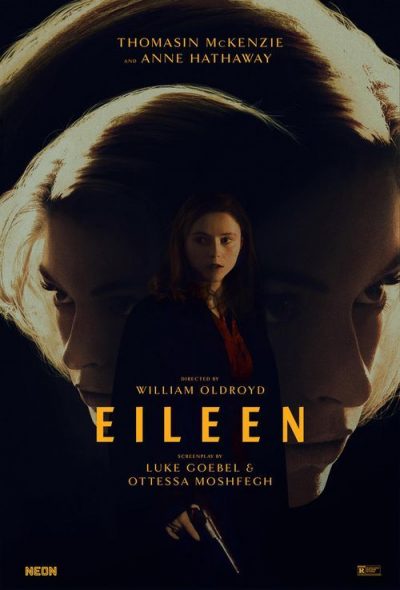
“Eileen” (USA/UK/South Korea)
Rarely have I seen a film as implausible, unfocused and meandering as this second feature outing from director William Oldroyd. After an impressive debut with “Lady Macbeth” (2016), the filmmaker has stumbled seriously in this latest effort, a supposed psychological mystery/thriller that never finds traction and yet somehow manages to go wildly off the rails in the final act. This cinematic misfire examines the relationship that develops between two women who work at a young men’s prison in 1960s small town Massachusetts. Eileen (Thomasin McKenzie) is a reserved, awkward, often-bullied, sexually repressed administrative assistant, and Rebecca (Anne Hathaway) is the facility’s newly hired, sophisticated, worldly, Harvard-educated psychologist. They quickly strike up a close yet somewhat unlikely bond with less-than-subtle (but apparently never-consummated) sexual overtones, a story thread that seems to be heading somewhere but never does. In large part that’s because the protagonists end up becoming involved in a hare-brained scheme worthy of Lucy and Ethel, only with significant implications, a scenario that comes out of left field and sends the narrative into serious, unexplained head-scratching territory. While the picture features a fine production design, a palette of creative cinematography, and capable Independent Spirit Award-nominated supporting performances by Hathaway and Marin Ireland, there’s not much else here that’s engaging, riveting or worthwhile, elements essential to a good mystery/thriller offering. Whatever the filmmaker was going for here obviously never comes to fruition, thanks to either its poorly composed script or its mishandled execution (or a combination thereof). Indeed, this is one of those films where virtually the entire project truly would have been better off left on the cutting room floor.
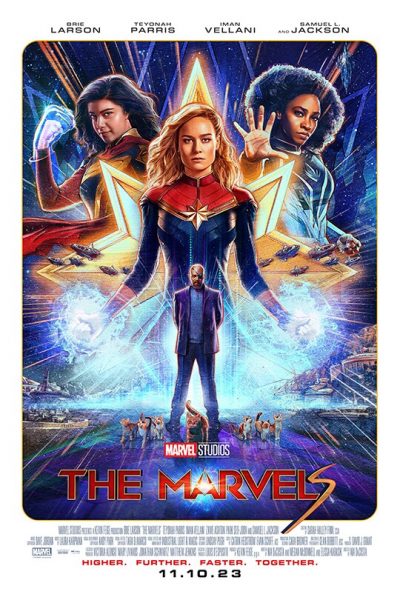
“The Marvels” (USA)
When I first heard the title of this movie, I thought it was about a 1960s girls’ singing group. And, frankly, that would have probably made for a better movie. Writer-director Nia DaCosta’s third feature outing and the latest in the Marvel Universe paradigm is a wildly inconsistent superhero movie that tries too hard to do too much and doesn’t have a script to support it. Too many of its plot elements aren’t adequately explained until well into the story, while others aren’t explained at all, leaving viewers who aren’t comic book laureates wondering what’s going on (particularly at film’s end). Meanwhile, other narrative aspects frequently appear gimmicky and grow old quickly, such as the introduction of the primary superpower that its three protagonists share, one that almost becomes slapstickish after an all-too-brief while. On top of that, the CGI effects vacillate from one end of the quality spectrum to the other, creating a mix of images that are either startling to look at or stunningly cheesy at best. Add to that a villain that isn’t particularly menacing, along with attempts at humor that either succeed brilliantly (cat lovers take note) or that fall flat and look incredibly lame (as aficionados of musical theater will undoubtedly attest), all of which further add to the picture’s pervasive inconsistency. The inclusion of ample clues for advancing the overarching Marvel Universe storyline continues here, too, furthering a trend that’s growing tiresome in the studio’s releases, a development akin to the “Paul is dead” legacy come to life with every passing picture. Then there’s the trio of heroes themselves, who often appear more like they’ve been plucked from a giddy slumber party flick or a Cyndi Lauper video than taking center stage as seriously empowered champions in an action-adventure offering, a big drop-off from this film’s predecessor. All of these failings combine to make this production more of a forgettable placeholder in the Marvel mythology than a standalone feature (not to mention a pale substitute for a sequel to the far-superior film that launched the Captain Marvel franchise in 2019). In short, “The Marvels” is as much of a mess as it is a movie, and that’s troubling for several reasons. It lends credence to the growing criticism that films like this aren’t to be taken seriously. It reinforces the notion that they’re cookie-cutter in nature, easily interchangeable with one another. And it raises questions about the career choices of lead actress Brie Larson, who, though quite capable of playing roles like these, is running the risk of becoming type-cast, a troubling prospect for an Academy Award-winning actress who possesses a depth of talent and is handily adept at taking on better and more serious material than this. In the wake of this release, Marvel Studios should take a step back and seriously assess where its future is headed, especially if movies like this are any indication. As pictures like “Black Panther: Wakanda Forever” (2022) show, the studio is capable of better work – and it’s time to show viewers that.
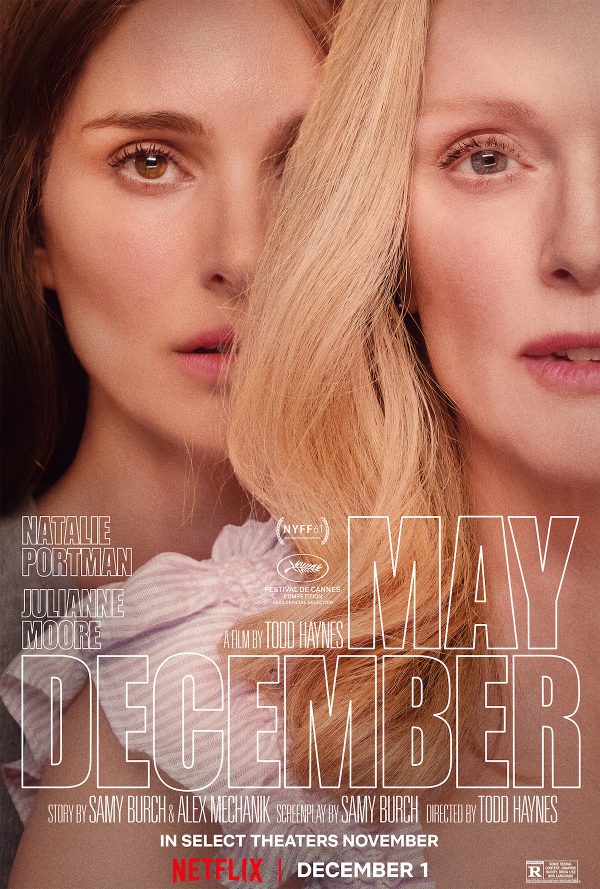
“May/December” (USA)
In moviemaking, there’s subtlety, and then there’s subtlety carried too far. In the case of director Todd Haynes’s latest, the filmmaker unfortunately indulges himself far too much in the latter. This story of an actress (Natalie Portman) who visits a middle-aged sex offender (Julianne Moore) to prepare for a role she’s about to play in a movie about her subject’s life never seems to find a footing to stick with and explore. The narrative examines many different aspects of the back story behind the lives of the characters to be portrayed in this pending production without ever really resolving any of them by the time the credits roll. This includes not only the protagonist’s reasons for pursuing her once-underage husband (Charles Melton) – actions that got her jailed and made her fodder for countless tawdry tabloid cover stories – but also the nature of the actress’s real motivations in conducting such an excessively intense in-depth study of her character. In the process, virtually everyone comes across as somewhat unsavory, and, considering that the truth is never clearly revealed about any of them, it begs the question, why should we care about any of this? The film depicts all of this so subtly that it goes beyond nuance, veering into the realm of enigmatic, thereby further reinforcing the notion of why any of us should care. Ironically, these underplayed elements are in stark contrast to some rather obvious (and terribly trite) symbolism, particularly in images related to themes of transition and transformation. The picture’s inconsistent changes in tone don’t help, either, vacillating between allegedly serious drama and a seemingly underdeveloped desire to break out as an exercise in full-fledged camp (which, by the way, probably would have made this a much better offering). The Oscar-nominated script’s meandering flow and glacial pacing also don’t help, leaving viewers scratching their heads more often than not as to where this story is headed. In the end, all of the foregoing is ultimately quite unfortunate, because there’s definite potential in this project, but it’s never adequately defined and fleshed out. Leads Moore and (especially) Portman turn in admirable efforts to make this material fly, but they simply don’t have enough to work with to make that happen. While there appear to be allusions to themes like the difficulty involved in dealing with long-buried feelings and the fact that we may never be able to adequately grasp the truth behind them (either as outsiders looking in or as active participants in the midst of such dealings), the cryptic handling of those ideas undermines whatever meaningful messages or cinematic value they might have, making all of this seem like just such a big waste of time, the film’s many awards season nominations notwithstanding. Director Haynes has an impressive filmography behind him with such releases as “Poison” (1991), “Far From Heaven” (2002) and “Dark Waters” (2019), but, regrettably, “May December” certainly can’t be counted as part of that list. Watch these other offerings instead.
Disappointing Delayed Releases (In Alphabetical Order)
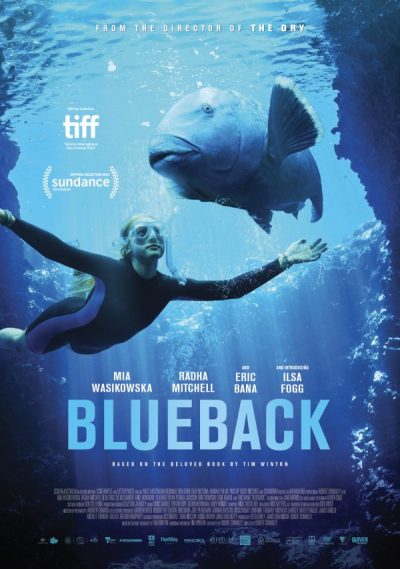
“Blueback” (Australia)
I feel somewhat guilty criticizing a picture that seems to have its heart in the right place but that, frankly, just isn’t very good. Such is the case with director Robert Connolly’s latest, an earnest but schmaltzy, predictable, uneven offering that addresses noble sentiments but isn’t put together well. The film tells the story of Abby (Mia Wasikowska), a marine biologist who’s called away from her coral reef studies to care for her aging mother, Dora (Elizabeth Alexander), when she suffers a debilitating stroke that has left her unable to speak. Upon Abby’s return home to her Western Australia coastal community of Longboat Bay, she reflects back on how her mother got her interested in oceanography, particularly through her efforts to establish a local marine preserve. This part of the story is told through extensive flashbacks featuring Abby’s younger self (Ariel Donoghue, Ilsa Fogg) and a youthful Dora (Radha Mitchell) in their efforts to protect the bay from illegal fishing and potentially damaging waterfront development, especially after they meet and “befriend” a large wild blue grouper that Abby names Blueback. The film thus raises and addresses an array of issues related to environmentalism, ecological stewardship and cross-species relations, as well as following one’s passions and walking one’s walk. Unfortunately, the flashbacks dominate the narrative so much that the story thread that launches the picture feels more like an afterthought, one in which Wasikowska almost could have phoned in her part. And, as for the content that makes up the bulk of this release’s screen time, it comes across as laudable and well-meaning but a little too obvious and preachy, playing more like the script of an After School Special or material based on a selection from an all-girls’ Young Adult reading group. The somewhat insipid treatment of this story tends to undercut this release’s other strengths, such as its gorgeous underwater cinematography and the value of the messages it’s seeking to impart. Some might say the foregoing sounds cruel and heavy-handedly cynical, but at least it’s honest, all good intentions aside.
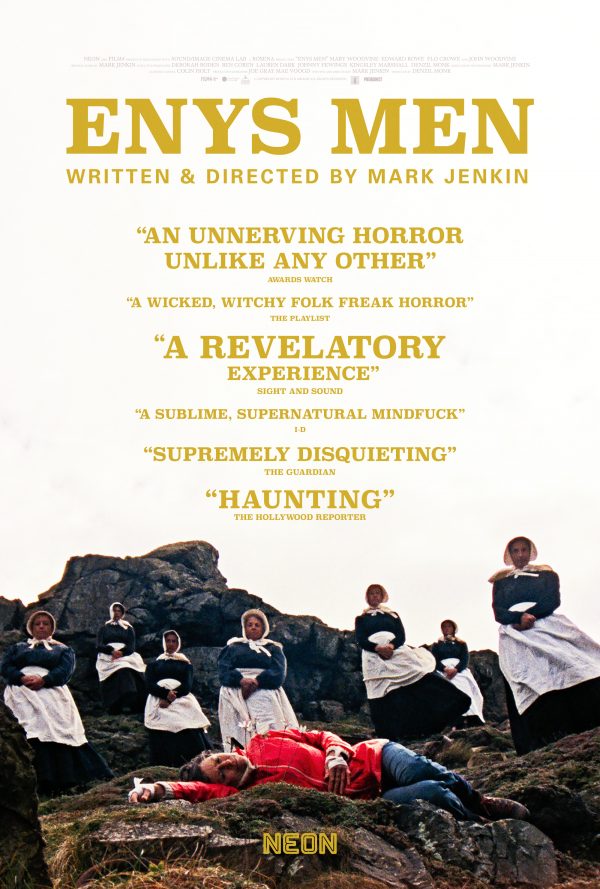
“Enys Men” (UK)
Well, I’ll say this much about this one – I knew I had one of the movies for my 2023 worst films list when I screened this early-year release. Writer-director Mark Jenkin’s so-called horror offering is an absolute mess almost from the very beginning. Set in 1973, this story (if one could call it that) of a wildlife volunteer’s study of a rare flower that grows on an uninhabited island off the coast of Cornwall thrusts the curious but bewildered protagonist (Mary Woodvine) into a surrealistic metaphysical odyssey in which she struggles to determine what’s real and what isn’t. Of course, the problem with that premise is that the viewer is saddled with the same task and likely won’t have much more luck at this than the puzzled environmentalist. The bizarre mixture of imagery, from the wildly imaginative to the everyday mundane and everything in between, is undoubtedly stylish and may be modestly appealing to look at (especially with its skillfully crafted 1970s-style camera work, film editing and intentionally grainy image quality), but there’s an utter lack of focus that keeps audience members at arm’s length (whether intentionally or not) and never provides any kind of meaningful hook with which to engage them. And what the filmmaker supposedly passes off as horror is anything but. Horror is supposed to frighten and shock viewers, not put them to sleep, which is what this picture increasingly does the further one gets into it. Instead of chills and thrills, the picture is interminably boring, eventually becoming cryptic, confusing and downright laughable. I can’t recall how many times I found myself rhetorically asking, “What the hell is supposed to be going on here?” Admittedly, Jenkin is, laudably, an experimental filmmaker, and his supporters have staunchly (yet ultimately euphemistically) referred to this work as a “mood piece.” Frankly, however, I find that a pretentious way of describing what amounts to an amateurish, directionless exercise that plays more like an out-of-control student film project on steroids than a piece of serious cinema. If you’re really and truly up for something atmospheric that delivers the goods and provides a satisfyingly insightful narrative, there are plenty of other better offerings out there. You’ll feel much more fulfilled and entertained by those pictures – and you’ll probably stay awake for them, too.
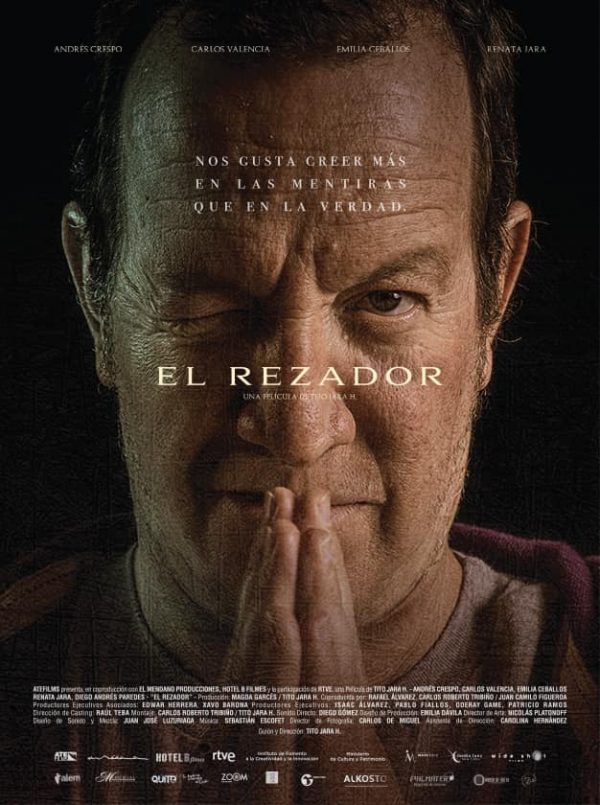
“El Rezador” (“The Preacher”) (Ecuador/Spain/Colombia)
Many religious experiences that can’t be readily explained are simply chalked up as “holy mysteries.” And, comparably speaking, as for many of the cryptic plot developments that emerge in writer-director Tito Jara’s second feature outing, such events simply appear to be passed off as narrative mysteries. This story of a religious con man (Andrés Crespo) who convinces the parents (Emilia Ceballos, Carlos Valencia) of an allegedly gifted miracle child (Renata Jara) to set up a business based on their daughter’s supposed healing powers starts out credibly enough but soon falls back on clichéd plot threads, eventually deteriorating into a muddled mess that’s virtually indecipherable. Every few minutes, new developments arise seemingly out of left field, many of which are left significantly unresolved, almost as if these script ideas were casually thrown together, the result of which is some kind of incomprehensible narrative stew. The picture’s hodgepodge of subplots covers everything from the operation of the business to the veracity of the child’s gifts to the health of the con man to the marital fidelity of the parents and even a few supposedly supernatural twists that are sprinkled in essentially as mystical throw-aways. Perhaps this lack of clarity is attributable to cultural concepts that are somehow lost in translation, but I’d more likely suspect that it’s more a result of poor writing and a lack of diligent script revision after the initial draft. Given the prevalence of religion in Latin American culture, the description of this film made it sound like an intriguing watch. Instead, it comes across as a trite, largely unintelligible pile of clutter that’s not worth the time.
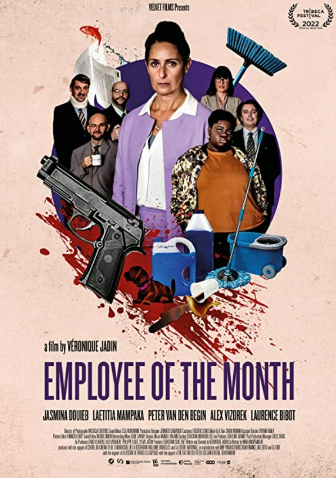
“Employee of the Month” (“L’employée du mois”) (Belgium)
It’s hard to convey my level of disappointment (and disgust) when it comes to this perfectly dreadful movie. As one of the pictures I was most looking forward to seeing at the Gene Siskel Film Center Chicago European Union Film Festival, I walked out at the end thoroughly appalled by what I had just watched. What should have been a screwball dark comedy with a premise loosely based on elements from the classic workplace farce “9 to 5” (1980) and the long-running hit TV sitcom The Office somehow managed to find ways to completely miss the mark from start to finish. To begin with, as a picture that’s supposed to be a comedy, it simply wasn’t funny, with virtually every bit failing to land. Then there was the pacing, which was far too laborious for a story that should have moved by at breakneck speed. But, perhaps most importantly, writer-director Véronique Jadin doesn’t appear to have a handle on what distinguishes macabre humor from nasty, mean-spirited poor taste. I can’t believe how many times during the picture I caught myself saying “There’s absolutely nothing funny about that.” And, even if this production were meant to be a goofy, gory tale a la movies like “Raw” (2016) or “The Columnist” (“De kuthoer”) (2019), it’s not nearly campy, creative or playfully over the top enough to be able to pull off that feat. What’s more, the film’s attempts at making statements about equal pay, toxic masculinity and sexual harassment in the workplace are far too obvious and heavy-handed, expressing sentiments that virtually anyone save for those who’ve spent years living in a cave should readily be able to recognize without being beaten over the head. Thankfully, the only saving grace here is the picture’s mercilessly short 1:18:00 runtime, but even that feels eons longer than it actually is. I suppose the most troubling thing I find about this offering, however, is that I actually heard audience members laughing during this travesty. It made me wonder about people these days and how they could possibly see the humor in any of this. There’s a big difference between a deft touch and a sledgehammer approach, even in dark comedies, but the filmmaker apparently doesn’t recognize it, and that shows in her work.
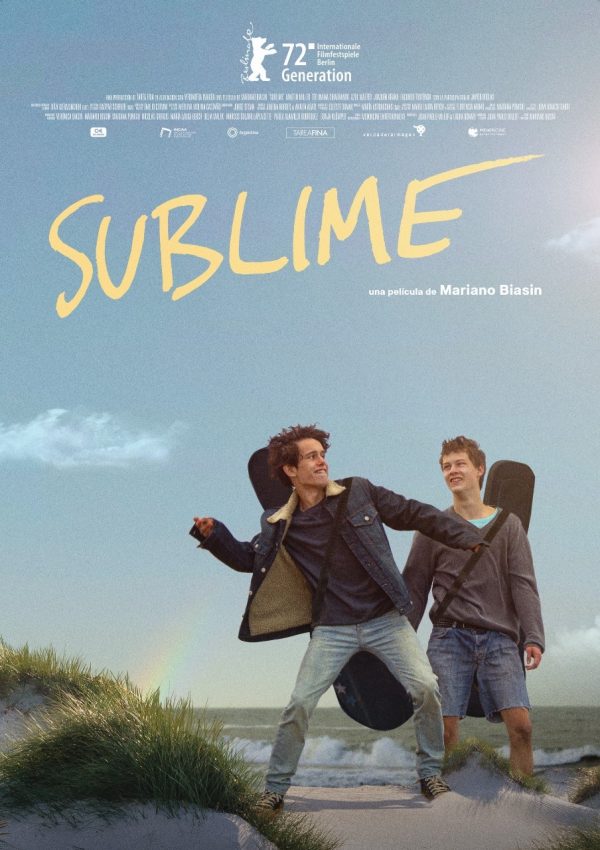
“Sublime” (Argentina)
There certainly has been no shortage of coming of age films in recent years, and many of those have had LGBTQ+ elements as part of their storylines. And now writer-director Mariano Biasin has added to that list with his third feature offering about a teenage boy who’s become infatuated with one of his longtime pals from childhood. To complicate matters, as members of an aspiring rock band, they spend much of their time together, which leads to an ever-growing fixation for the curious young man the more he’s in his friend’s company. His feelings become further strained when his sidekick starts bragging about his growing list of female conquests, prompting quiet but powerful fits of jealously from his secret admirer and increasing tension in their long-tenured relationship. Unfortunately, other than the rock band story thread, this is far from an original narrative in the history of LGBTQ+ cinema. What’s more, the opening act is more of a jumble of rambling, seemingly unrelated images than the makings of a coherent story, almost to the point where this film would have been better titled “Cryptic” or “Vague.” Moreover, the picture places a strong emphasis on its musical numbers, most of which are admittedly decent enough, though there are quite a few of them, a fact probably attributable to the filmmaker’s experience as a director of music videos. But, when you add that to the fact that the screenplay tends to get somewhat repetitive as the story plays out, you’ve got an increasingly tedious film that leaves viewers wondering when all of this is finally going to get wrapped up. In short, “Sublime” is a work that could definitely use some retooling (and a little more imagination) to make it a more worthwhile viewing choice, especially in light of the many other better options available in both gay cinema and music videos. Choose them instead.
Copyright © 2023-2024, by Brent Marchant. All rights reserved.



